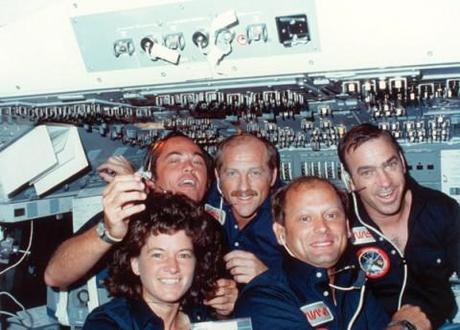 Sally Ride with fellow astronauts abroad Challenger in 1983. Photo credit: NASA.
Sally Ride with fellow astronauts abroad Challenger in 1983. Photo credit: NASA.
The background
Sally Ride, the first US woman in space, has died at 61 from pancreatic cancer.
In 1983, 32-year-old Ride was part of the space shuttle Challenger mission – making her not only the first American woman to travel to space but also, at the time, the youngest person to do so.
According to the BBC, Ride held four university degrees, including a doctorate in physics, and wrote a series of children’s science books after leaving NASA.
“As the first American woman to travel into space, Sally was a national hero and a powerful role model,” said President Barack Obama, reported the BBC.
An inspiration to little girls
Feminist activist and journalist Gloria Steinem, who attended the 1983 launch, told Newsweek at the time that Ride’s flight was hugely significant: “It means that millions and millions of little girls are going to sit in front of the television and know they can become astronauts after this.” This was certainly the effect it had on Annalee Newitz at io9: “Because of women like Ride, I grew up in a world where female astronauts were not just fictional … Because of Ride’s trip offworld, I saw the future differently than my mother did when she was young.”
“It’s too bad this is such a big deal. It’s too bad our society isn’t further along,” said Sally Ride at a NASA press conference ahead of her historic flight, reported The New York Times.
Not a great moment for feminism
“Sally Ride, rest her soul, absolutely rocked. She was smart and courageous, unabashedly a feminist, and she called out sexism before, during, and after her time as an astronaut,” wrote Laura Helmuth at Slate. But her space flight was not the great moment for feminism that many commentators claim it was. “The fact that it took until 1983 to have a female astronaut just emphasized NASA’s nasty history of sexism,” Helmuth said, pointing out that the first woman in space was in fact Valentina Tereshkova, with the Soviet space programme, in 1963. “The United States could have sent the first woman into space much, much earlier.”
Ride’s real legacy was to science
After NASA, Ride founded a company to encourage girls to follow careers in science and technology. According to Karen Tumulty at The Washington Post, she was inspired to do so by statistics that show girls tend to lose interest in a career in science the older they get, which Ride ascribed to lack of encouragement.”That is a legacy, she knew, that will last far longer than the eight days she spent aboard a space ship.”

